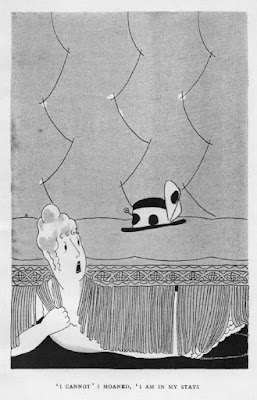People had been dragged out of retirement all over the place because of the event. Lily inherited worn-out patience, a worn-out nursery, a worn-out nanny, and a worn-out governess yanked back from Worthing. She had retaliated against the general resentment with stubborn hatred of all the family stood for. The stuffiness, the arrogance, the pride.
As the story opens, the incorrigible Lily de Veaux-Cracey, youngest daughter of an age-old aristocratic family, has just been dubbed "the Dizzy Deb" by the media. Just back from a year on an American ranch, where she caught deadly snakes, roped cattle, and enjoyed wide-open spaces, she had made an unfortunate demonstration of her cattle-roping technique at a formal gathering, which results in the inadvertent hoisting of a Russian ambassador and a resulting international scandal. The family forbids her to draw any further attention to herself, and Lily responds by leaving high society altogether, moving to London, incognito, to go to work like other young women.
She is perhaps in part inspired by the shade of Drury Lane Lil, another black sheep in the family—rival of Nell Gwyn for King Charles' affections, now a cheerful ghost wandering the house and occasionally making mischief. Once a year she re-enacts her fatal leap from from the battlements (perhaps due to having lost His Majesty's affections, or perhaps merely because in a careless moment she believed herself a butterfly), and she occasionally comes along to provide comfort and inspiration to Lily, who is truly a chip off the old block:
She crouched in the Round Room, desperately seeking a way of escape. Escape of course, from the family. There was no indignity such as locked doors inflicted upon her. She sat now, her head on her arms on the table by the narrow window. Lil seeped through the door, fluttered invisibly to her side and sat on the high window sill.
"La, sweetling," a ghostly voice trilled, "you're inconsolable! Fie, for shame! Where's your spirit, Lily? A year or two from now and you'll be the talk of the town."
Once in London, Lily tries her hand as a secretary, after (perhaps possessed by Lil) performing spectacularly on a typing test, a feat sadly not to be repeated. She has to exert considerable effort dodging her monstrous, posh sister Phoebe, as well as Jeremy, a solicitor (or do I mean barrister?) at the Inns of Court, intended by the family as a perfect spouse for Lily, though the Dizzy Deb herself finds him stuffy and drab (however often he seems to come to her rescue).
Among her other adventures, Lily makes a bumpy attempt at romance with a Bolshevik at her boarding house, which leads to a hospital stay after she joins him in his attempt to break up a meeting of fascists. The hospital stay in turn leads to further complications (not to mention headaches for hospital staff), including a criminal prosecution against the Cockney husband of a salt-of-the-earth fellow inmate, who helps her escape but gets caught outside her building in what looks very much like a burglary.
It's all pretty far-fetched, and not the very best of this kind of farce, but it was quite entertaining and occasionally giggle-inducing, and plausible or not Lily is an entertaining heroine. Despite the title, Drury Lane Lil doesn't appear very frequently—it's just an extra touch of comedy that was perhaps exaggerated a bit by the publisher to give the book a fresh angle—but it might be just as well. It's hard to believe that Lily grew up in the de Veaux-Cracey clan, or that, having done so, she would be so violently opposed to them, but if you can just accept her, implausible as she is, she's great fun to hang around with for a time.
Also, having spent a number of years now as a secretary myself, I rather relate to the tortures Lily faces in her new job:
There is something peculiarly destroying, to those not temperamentally suited to it, in the esotericism of office work, particularly at its first, mysterious introduction. Its deadly demands on those unfit for it can produce chaos, heartbreak and sheer farce. Lily produced all three. Her ignorance of commerce was abysmal. Her training nil. With each successive disaster her terror mounted, her courage ebbed, and the exacerbation of her nerves increased.
Her adventures with carbon paper and stencils goes even beyond the horrors that I've ever encountered—technology has, while apparently bringing about a likely armageddon, at least rid us of such minor inconveniences…
Shades of Lil! was the fourth and final novel by Australian author Anita Campbell (thus not on my list of British and Irish women writers). Her first three books, Apostrophe to David (1944), Whither Thou Goest (1945), and Dawn Is a Signal (1946), all seem to have been published only in Australia, and were described by Campbell herself as "angry young woman stuff". Only Lil, more than a decade later, appeared from Peter Davies in the UK, though an article about her in the Sydney Morning Herald suggests she had completed another novel since and was working on yet another. The article also mentions that she had been an actress in Sydney, and she added "In fact I always consider myself a better actress than a writer."
.jpg)
.jpg)



